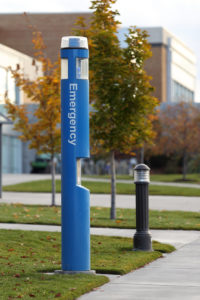College Campus Safety Series: Part I
September 1, 2017
INTRODUCTION
Welcome to Part I of a three-part blog series on college campus safety! First, we’ll cover what students can do to make themselves safer on campus, then how universities can contribute to student safety, and finally, fire safety on campus. Be sure to tune in weekly, and let us know your campus safety tips in the comments.
THINGS YOU CAN DO TO KEEP YOURSELF SAFE
Most college campuses are like cities within cities, offering their own campus security. However, just like living in the “real world,” there are a few things you can do to add an extra level of personal security. It’s not just Mom and Dad looking out for you anymore; we encourage you to stay safe on campus with these tips from Part I of our College Campus Safety series!
1. Get to Know Your School’s Campus Safety Office
Your tuition likely funds either a campus safety office or campus security depending on its size. Familiarize yourself with where it is located and the services it provides. Program their phone number into your phone. Figure out the most secure paths to and from class. Study the locations of the emergency phones, often called blue lights. Find out if there is a campus escort service for your night activities or classes.
PRO TIP: If you have a vehicle or bicycle on campus, you might want to register it with campus security in the event it is stolen.
2. Resist the Urge to Geotag on Social Media
Social media is a great way to connect with your peers and stay in touch with the family you left behind to come to school. However, advertising your every physical move may invite trouble. So, when you are out and about or even home alone, resist the urge to post your whereabouts as they happen. One way around this is to geotag the following day! Just avoid leaving any breadcrumbs that could lead a complete stranger straight to you.
PRO TIP: Check the privacy settings for all of your social media accounts and turn off location settings when possible.
3. Walk with Confidence and Know Where You Are Going
Think about tourists in foreign countries and how easy they are to spot. Don’t be a tourist on your college campus! Study the maps and most traveled routes, even if they take a little longer. If you do get lost, walk confidently until you can get to a safe spot to figure out where you are going. Don’t forget to download your school’s campus map to your smartphone.
PRO TIP: There’s an app for that! For a more interactive map, search for your school on Campus Maps or other similar apps and download the map. This can also be useful for family and friends who want to visit you!
4. Limit Traveling Alone, Especially at Night
We get that there will be times that you have to hit the library late thanks to that procrastination habit you developed back in high school, but try not to go alone. Have a buddy system or utilize the campus escorts so that you aren’t by yourself at night, when more campus crimes are likely to occur. Be sure a couple of your friends or roommates know your schedule so they know when to start checking up on you, too.
PRO TIP: Again, there is an app for that! Noonlight allows you to press a button when you feel unsafe, and easily call off help once you feel safe or immediately alert the local police (or campus police) when you are in danger without ever having to utter a word.
5. Learn Self-Defense & Carry Supplies to Help
Self-defense is an invaluable life skill that, once you learn it, you’ll have indefinitely. Your college or university may even offer self-defense classes or, at minimum, martial arts, which means you can earn credit while taking a break from your studies. To help strengthen your efforts, consider also carrying pepper spray, mace, and/or a whistle.
PRO TIP: Krav Maga is a fairly popular form of self-defense and you can bring a friend or two if you’re feeling shy.
Danger isn’t lurking around every corner and our goal isn’t to make you paranoid, but instead to avoid certain well-known risk factors. Play it smart even though the odds are with you. For additional resources on campus security, check out the U.S. Department of Education’s website or contact us for help accessing more specific information! And, don’t forget to tune in next week for Part II of our College Campus Safety series!
 Careers
Careers Customer Support
Customer Support (800) 473-7627
(800) 473-7627 Contact Us
Contact Us Locations
Locations
